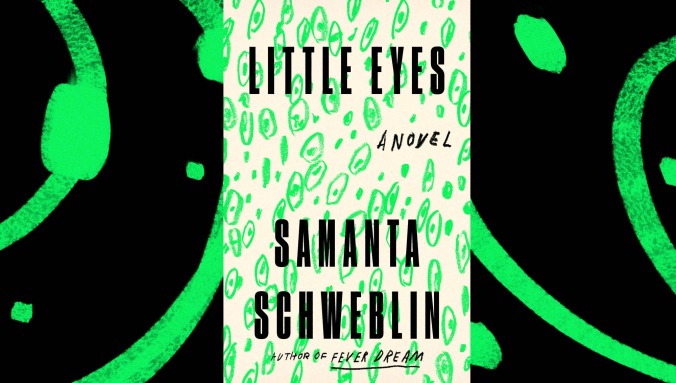
In Samanta Schweblin’s new novel, Little Eyes, kentukis are the year’s must-have smart device. “Nothing more than a cross between a mobile stuffed animal and a cell phone,” she writes, they are cutesy avatars—moles, crows, bunnies, pandas, owls, and dragons—embellished in unique colors, textures, and sometimes costumes. But kentukis offer a bit more bang for your buck. There are kentuki “keepers” and “dwellers.” Keepers keep, or own, the expensive toys (pronounced like the Bluegrass State). Dwellers plop down $70 to dwell—inhabiting, operating, watching from within, on a screen far away, like an Alexa with an actual soul. In Little Eyes, social distancing and social connectivity are one and the same.
Chapters bounce around the globe, from user to dweller, and back again. A newly divorced father in Umbria purchases a kentuki for his siblingless son. A son gifts a kentuki to his lonely mother in Lima, Peru. A boy in Antigua steals money to buy a kentuki for himself, and frolics in the snowdrifts of Honningsvåg, Norway without leaving his computer. The Peruvian mother watches a younger woman in Erfurt, Germany cook dinner, brush her teeth, have sex. The Umbrian son never much cares for his kentuki, but behind its animatronic eyes, the kentuki seems to care.
Like Gremlins, kentukis come with their own set of rules. Each device is connectable to a single computer or tablet, and is good for a single life. Neglect to recharge or choose to unlink from a kentuki and the device becomes no more useful than a $279 furry paperweight. Kentukis can hear and translate speech but cannot speak, though, depending on the avatar, they can communicate via simple purrs, chirps, and roars.
But like a Furby as dreamed up by the Black Mirror writers room, there’s a dark side. There are kentuki suicides, kentuki perverts and pedophiles. Kentukis are turned into rolling, dildo-armed sex toys, tortured, mutilated, murdered.
In the hands of Stephen King, kentukis might become psychotic little gore-splatterers, the love children of the Five Nights At Freddy’s characters and a Roomba. But as in Schweblin’s first two books to be translated into English, a masterpiece novella, Fever Dream, and a collection of surrealist short fiction, Mouthful Of Birds, the Argentinian author eschews full-bore horror for an unsettling, Shirley Jackson-esque phantasmagoria. Little Eyes readers might experience the feeling that, Wait, isn’t this already happening?
Keepers learn to communicate with their kentukis via ouija boards. They form deeper attachments with their devices and their dwellers. An ingenious young entrepreneur in Zagreb figures out that armchair travelers will pay eight times more if they can choose the location in which they dwell through pre-established connections: the Australian Outback, Arctic Circle, or mired in the squalor of a Mumbai slum.
An owl in Rome turns oracle, delivering up lottery numbers and advice at five euro per consultation. A kentuki liberation front emerges to free imprisoned dwellers from their keepers. A disillusioned user asks, “What were all those people doing rolling around on other people’s floors, watching how the other half of humanity brushed their teeth.” A bunny dweller buys herself a bunny, fulfilling the narcissistic meta function the kentuki ultimately promises: “It would be like having herself moving around her own house.”
As an allegory of digital connectivity, Schweblin succeeds and fails. Kentukis are a creepy, believable plot device, the users and dwellers are as real as you and me, but the dissociated world they inhabit never quite gels—dwelling and using perhaps feels a bit too familiar. Which is no doubt Schweblin’s message, a message that especially bears reiterating today: How do we measure the era of social distancing, when we’ve been social distancing all along?